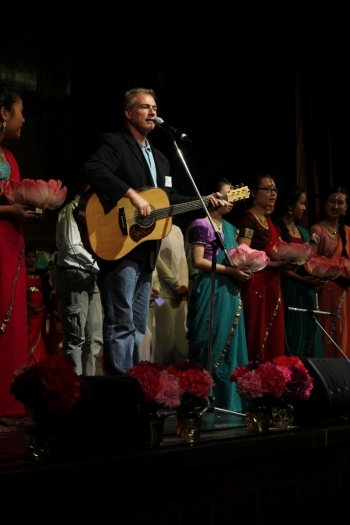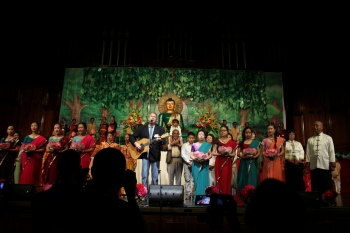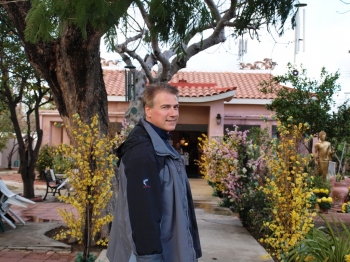“If music be the food of love, play on. So Shakespeare gloriously states in Twelfth Night.” Music can also play an important role in religious expression, allowing devotees to have an immediate emotional and connection and response to the teachings and events marking significant moments in the religion’s development and daily life. It can be as simple as the beating of drums to accompany a dance and song invoking the spirits, natural forces, or the gods. It can be as complex as an oratorio or requiem composed by Bach, Beethoven, or Verdi. It can be as contemplative and sublime as Gregorian chanting.
BDI has followed with great interest the musical creativity and output of Andrew Williams who has used the musical idiom and genres to celebrate Buddhism. He is not only a performer but also a lyricist and composer of annual Vesak musicals in Australia and abroad.
After listening to his 2012 Vesak album, Universal Love of the Buddha, BDI caught up with Andrew to investigate further his musical career, creative process, and approach to giving Buddhism a musical expression which both moves and deepens the listener’s awareness and appreciation of Dharma.
JC: John Cannon
AW: Andrew Williams
JC: Do you pay attention to any new or emerging talent for possible inspiration or do you prefer to follow a specific genre to maintain the relative seriousness of Buddhist music?
AW: I don’t pay any attention to any particular artist or genre when writing. I am simply inspired by Buddha Dharma and my aim is to share the Dharma in many ways, including through music. I think that as long as we maintain the Dharma’s essence, spirit and integrity, then it is possible to share the Dharma in myriad ways for the benefit of many types of sentient beings. The chosen style/genre should be appropriate and reflect what we are trying to convey. Of course, the utmost importance is our motivation and intention.
JC: How do you ‘modernise’ Buddhist music so that it can be taken seriously by Buddhists and those just looking for good music?
AW: The Dharma is timeless and, so too, is its pure expression. Therefore, all the different ways to express the Dharma are timeless. The popularity of different styles/genres of music is constantly in flux, constantly coming and going. Therefore, they can be termed at various times as ‘modern’ or ‘not modern’ depending upon the listener’s perception. While the Buddhist teachings exemplified in the songs should be taken seriously and put into practice, I think it is fine to have a bit of fun and creative licence musically. However, it should be appropriate and reflect the true meaning of the teaching. Of course, we have to take into account the need to keep people’s attention and also attract newcomers to the Dharma.
JC: Can you describe the creative process between you and Roger McLachlan?
AW: After I have written and prepared the songs and music to a level I’m happy with, Roger and I would record acoustic demos. After poring over them for a short while, we would come up with ideas related to production, arrangement, and performance, both individually and collectively.
Then we begin recording the real thing at his home studio ‘Low Note Studios’, allowing ourselves to be free, flexible and creative while maintaining correct motivation. We have been great friends and colleagues for over 25 years; we know and complement each other very well. Although the whole process involves a lot of time and energy, our experience has been one of joy and fulfillment.
JC: What artists or bands have influenced your 2012 album?
AW: As with my other Buddhist musical CDs, I was not directly influenced by any particular artist or band. Universal Love of the Buddha is simply the story of where, when and why the Buddha gave his teaching on Universal Loving-Kindness (Kariniya Metta Sutta). From the lyrical point of view, the lyrics have to be clear, precise and interesting according to the existing historical records. From a musical point of view, both the work as a whole and the individual songs themselves have to flow or change texturally and dynamically according to what’s happening in each part of the story. Having said this, over my many years of singing, writing and performing music I have had many indirect influences from different genres and artists, too numerous to mention.
JC: Which is your favourite track from the 2012 Vesak album and why?
AW: As this CD tells a story from beginning to end, every song plays an important part of the whole. Lyrically and musically I’m very happy with all of the songs. If I have to choose my favourite songs, musically they would be Liberation and Reverence, which are musically and instrumentally an embellishment of each other. Generally, the favourite song for other people tends to be One People. Humbly speaking, the songs on this CD are ‘all good’.
JC: What are the main challenges you face in creating an annual musical and how do you overcome them?
AW: I decide the subject matter or story to write about and present followed by the creative, writing and recording process. The challenges here are mainly related to the time and energy it takes to complete the process. It’s just a matter of having a balance of joy, enthusiasm, and discipline while maintaining a clear, relaxed, flexible, patient, creative and open mind. I also think it is important not to overthink things, not to create new challenges. Just know the subject and trust my instincts, remaining free to make changes, if needed, at any time.
Once we get into the studio to begin the recording/producing process, an extra challenge would be coordinating the schedule with Roger while also balancing our other commitments. During the recording process, there is the extra and significant challenge of organising the choir, performers and dancers for the actual performance with the various temples involved. Coordinators from the temples assist me to plan rehearsals for the different groups, individually and collectively. This takes about 2 to 3 months, 2 to 3 days a week. As you can imagine, the more people involved, the more challenging it is to coordinate.
The musicals from 2010 to 2013, Birth of the Buddha, Enlightenment of the Buddha, Universal Love of the Buddha Parts 1 and 2, have had cast members of up to 60 people, mainly children and youth involved with the choir, acting and dancing activities. Between 10 and 20 kind and enthusiastic volunteers helped with rehearsals for each group, training, choreographing, making costumes, stage makeup, stage management, lighting, etc.
I guess an extra challenge for me is making sure everything, including such things as the script, stage directions and songs are clearly understood throughout the preparation and implementation process. Occasionally, we have difficulties due to language barriers. I guess, for me, the most challenging is coordinating and balancing everything. Obviously, the best way to overcome challenges is simply to put the Buddha’s teachings into practice.
JC: If you were to make a musical or album not related to Vesak, such as a Jataka tale or for a Mahayana sutra, what is the process for choosing the music genre and style?
AW: There are so many of the Buddha’s teachings and stories from his life that can be expressed through music, including Jataka tales and teachings from the Theravada, Mahayana, and Vajrayana traditions. I can also look at great Buddhist masters and practitioners throughout the ages for inspiration.
For the writing process, first I would make sure that the story I’m telling is accurate and agrees with the historical records. I would verify my own knowledge with various accounts in books, on the Internet and from other teachers and different traditions. Then, I would begin to write the lyrics as either poetry or an essay. Afterwards, come up with different types of songs: chord progression, rhythms and melodies, mostly just with guitar and voice. This is followed by matching the lyrics with the melodies and rhythms, a constant process of adding and subtracting while maintaining the essence, meaning and truth of the subject matter.
It is important to allow the songs to stand alone while, at the same time, remain part of a whole. After I’m relatively pleased with the outcome of this part of the process I will begin thinking about instrumentation and arrangement. I allow myself to be free and flexible throughout the whole process.
JC: Throughout your musical career you have exhibited such a refreshing variety of musical styles. How do you decide which one is appropriate for the particular musical piece you are working on?
AW: Most of the time these days, it’s instinctual. I try not to overthink during the creative process, just go with the flow. Although on occasions when it’s not flowing, it’s more like trial and error. I think it’s important not to limit ourselves or the possibilities by thinking of such things as ‘it has to be this way or that way only’. Just be free.
JC: Any follow up albums in the vein of Fearless?
AW: Yes, as soon as time permits and also funding for studio time, CD cover artwork, pressing and printing is available. I would like to record and album/CD entitled Be Kind to Yourself. I have already written and arranged the songs. They are stand alone Dharma songs covering a wide area of topics.
JC: How would you describe the trajectory of your musical career to date? Any special highlights?
AW: At 13 I began earning pocket money by teaching guitar at my guitar teacher’s music school and occasionally performing with his band. I also wrote my first song at this age, although I think I was mimicking the Beatles a bit. I continued to write and perform in my teens and early twenties. At 21 I began to do some TV acting and modeling too, which took me to Europe for the best part of two years and also to Japan. This was such a great learning experience at such a young age. I continued to write and perform music whenever and wherever possible, as music has always been my primary career focus.
Upon returning home to Australia, I concentrated solely on my music and formed two bands, Neo Classique and Andrew Williams Band. We had a reasonable success both with recordings and performing live. From 1991 to 1993 I had the opportunity to act and play lead characters in a couple of popular Australian TV shows, Neighbours and E-Street while continuing to write music and perform. In 1994 I went to Hollywood to work on Melrose Place and also had guest roles on various other US TV shows, all the while continuing with my music.
In 1998 I decided to stop my TV work to focus ‘more seriously’ on my Dharma studies and practice, still continuing writing music and performing. After a short period, I decided to focus 100% of my time and energy on studying, practicing and teaching the Dharma. When appropriate, utilising my music as a means to do this.
In the early 2000s I moved back to Australia to be closer to and be of benefit to my parents who had been and continued to be a great moral support for my Dharma activities and career. And so, the journey continues, neither coming nor going.
JC: For the final question, have you used music in your prison Dharma work?
Related Links
Universal Love of the Buddha
Birth of the Buddha
Enlightenment of the Buddha
Fearless

















